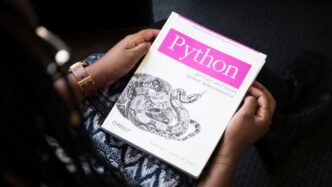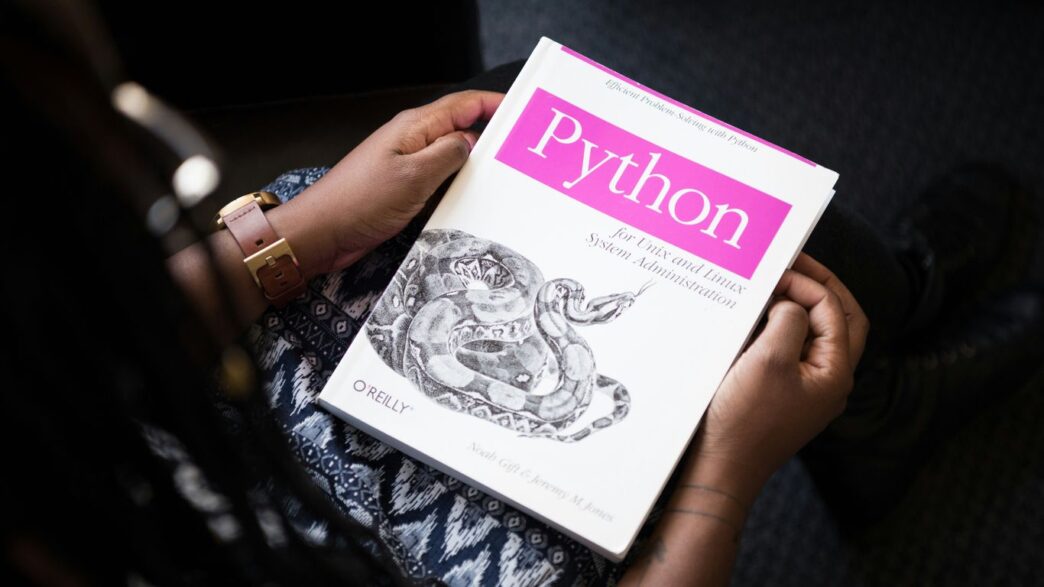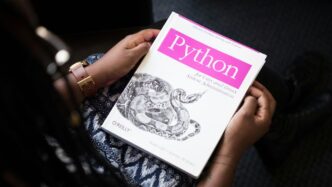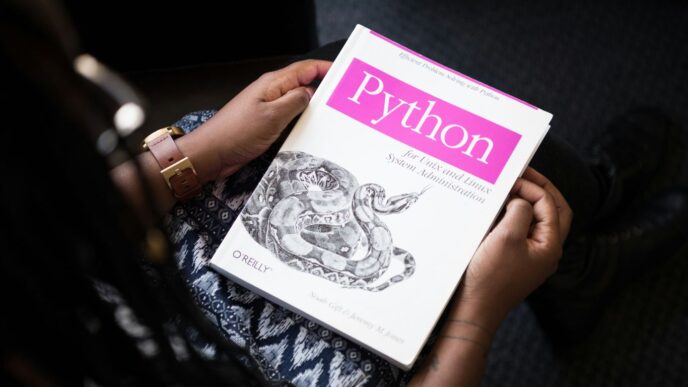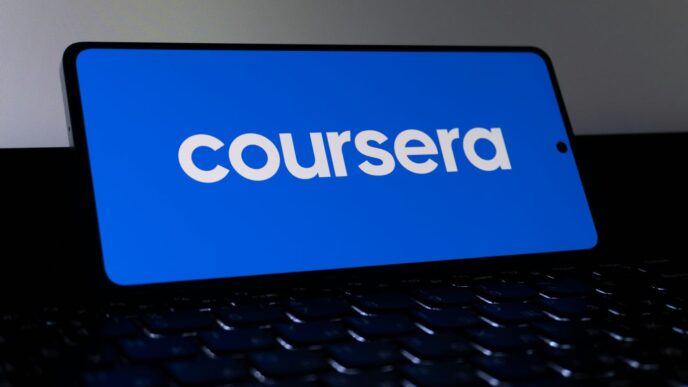Learning Python is a smart move these days. It’s used everywhere, from making websites to crunching numbers. The good news? You don’t need to spend a fortune to get started. There are tons of great, free online resources out there in 2025 that can teach you Python from scratch. Whether you’re a total beginner or looking to level up your skills, this list of free python course options should help you find something that fits your style.
Key Takeaways
- You can learn Python programming without spending any money by using free online courses, tutorials, and communities.
- Interactive platforms like Mimo offer hands-on coding practice from the start.
- Structured courses, such as ‘100 Days Of Code’, provide a daily challenge to build momentum and real skills.
- University-backed specializations like ‘Python For Everybody’ offer a more academic approach.
- Online communities and AI tools like ChatGPT can provide support, answer questions, and help debug your code as you learn.
1. Mimo’s Python Course And Python Career Track
Mimo offers a really hands-on way to learn Python, which is great if you like to jump right into coding. You don’t just watch videos; you’re actually writing code from the get-go in small, interactive lessons. It feels like you’re building something right away, which is pretty cool.
They have a couple of paths you can take. There’s a basic Python course that covers all the main stuff you need to know, like syntax, functions, and how to handle errors. It’s broken down into 14 modules, so it doesn’t feel overwhelming. Each part has exercises where you type code and see what happens instantly. This is a solid starting point if you’ve never programmed before.
Then there’s the Python Developer career path. This one goes deeper, teaching you things like data analysis using libraries such as Pandas, how to build websites with Python, and even some AI stuff. You’ll also get into databases and compare Python with other languages. They say you’ll build about 8 projects for your portfolio, which sounds like a good way to show off what you’ve learned. You can even get a certificate when you finish.
What’s nice is that Mimo has a free basic version, and you can use it on your phone too. While some features are locked behind a subscription, you can get a lot done with the free content. It’s a good way to try it out and see if their style works for you before committing to anything. If you’re looking for a way to get started with coding, checking out Mimo’s Python course is definitely worth considering.
2. 100 Days Of Code: The Complete Python Pro Bootcamp For 2025
This course, often cited as a top pick, takes a unique approach to learning Python. Instead of just throwing a bunch of information at you, it structures the learning process as a daily challenge. The idea is to build momentum and actually get you coding consistently.
It’s designed to take you from absolute beginner to someone who can build real things with Python. You’ll start with the basics, like syntax and data types, but quickly move on to more complex topics. Think object-oriented programming, web scraping, and even building your own portfolio website. The course emphasizes modern Python practices, so you’re learning with current tools and methods.
Here’s a look at what you can expect:
- Daily Coding Challenges: Each day presents a new task or project, keeping things fresh and engaging.
- Real-World Projects: You’ll build things like a coffee machine simulation, a web scraper, and a personal website, which really helps solidify what you’re learning.
- Modern Python Focus: The course uses up-to-date Python versions and follows current best practices.
- Structured Progression: It’s laid out logically, so you build your skills step-by-step without feeling overwhelmed.
This is a pretty long commitment, though. You really need to be ready to put in the time each day to get the most out of it. If you’re someone who learns best by doing and likes a clear path, this could be a great fit. It’s also a good option if you’re looking to complement your Python skills with SEO strategies, as some related courses offer this.
It’s a solid choice for beginners or even developers switching from other languages who want a structured way to learn Python.
3. Python For Everybody Specialization
Alright, let’s talk about the Python For Everybody Specialization. This one comes from the University of Michigan and is taught by Dr. Chuck Severance, who is seriously one of the best programming instructors out there.
What’s cool about this specialization is that it breaks down Python in a way that feels really accessible, even if you’re totally new to coding. It’s like getting a university-level education without all the confusing jargon and high costs. They really focus on making sure you understand the core ideas, not just memorizing syntax. You’ll actually work with real data, which is a big plus, and the community forums are pretty active, so you can usually get help if you get stuck.
Here’s a quick rundown of what you can expect:
- Clear Explanations: Complex topics are made to feel simple.
- Problem-Solving Focus: You’ll learn to think like a programmer.
- Real-World Data: You’ll use actual datasets in your projects.
- Active Community: Helpful forums with other learners and instructors.
It’s a great choice if you want a solid, academic-style introduction to Python, especially if you’re thinking about data analysis down the line. Just know that it might not dive as deep into modern web development as some other courses, but for building a strong foundation, it’s hard to beat.
4. Khan Academy’s Python Course
Khan Academy has a free Python course that’s broken down into six parts. It really focuses on how you can use Python in everyday situations. You get video lessons, written explanations, and even some interactive exercises where you can try building things like recommendation systems, simple games, or even population simulators. It covers all the basic Python stuff, and each section builds on what you learned before. You start with the simple commands and move up to more complicated data structures, all while making actual programs.
What’s good about it:
- It’s well-organized with 21 different skills to learn.
- You get to do hands-on projects in every part of the course.
- It has a built-in place for you to write and run code.
- The learning path is pretty clear, so you know where you’re going.
5. The Official Python Tutorial
Alright, so you’ve decided to learn Python, and you’re looking for a solid place to start. The official Python tutorial, found on Python.org, is a really good option if you’re the type of person who likes to read and work through things at your own speed. It’s basically the source of truth for the language, maintained by the folks who actually build Python.
This tutorial is pretty thorough. It starts with the absolute basics, like how to write your first line of code, and then it moves on to more complex stuff. You’ll get into things like functions, classes, modules, and even how to set up virtual environments. It’s all text-based, which means you can download it and read it offline, which is handy.
What’s cool about it is that it includes lots of code examples. You can copy these, paste them into your own Python setup, and see exactly what happens. It’s a very direct way to learn.
Here’s a quick rundown of what you can expect:
- Core Concepts: Covers all the fundamental building blocks of the Python language.
- Advanced Topics: Dives into more intricate areas like object-oriented programming and standard library modules.
- Practical Examples: Plenty of code snippets to try out yourself.
- Up-to-Date Information: Since it’s official, it’s always updated with the latest Python versions.
It’s not flashy, and there aren’t any videos or interactive exercises built right into the tutorial itself, but if you prefer a detailed, technical reference that you can go through at your own pace, this is a great place to begin.
6. Introduction To Python By JetBrains
JetBrains has put together a free course that’s pretty neat if you’re looking to learn Python while actually using a professional coding tool. It’s called "Introduction to Python," and it guides you through the basics of Python right inside PyCharm, which is an integrated development environment, or IDE. Think of an IDE as a super-powered text editor that also helps you find mistakes in your code and suggests ways to fix them. It’s a really good way to get used to what real developers use every day.
The course itself isn’t super long, with about 10 lessons. But within those lessons, you’ll tackle 76 coding challenges and 8 theory tasks. This means you’re not just reading about Python; you’re actively writing code and testing your understanding. It covers the core Python stuff you need to know, but also throws in some important development skills, all within the PyCharm environment. This hands-on approach, combined with the immediate feedback you get from the IDE, can make learning feel a lot more practical. Plus, getting familiar with an IDE like PyCharm for Students early on is a smart move for anyone serious about coding.
Here’s a quick look at what you can expect:
- Learn Python in a real development setting: You’re not just in a browser; you’re using a tool professionals use.
- Lots of practice: With 76 coding challenges, you’ll get plenty of chances to write and run Python code.
- Instant feedback: The IDE helps you spot errors and learn from them right away.
- Covers fundamentals and beyond: You’ll get a solid grasp of Python basics and how to use development tools effectively.
7. Full Stack Python
Alright, so you’ve got a handle on the basics of Python and you’re itching to build some actual web applications. That’s where Full Stack Python comes in. Think of it as a free, open-source book that basically walks you through the whole Python web development scene. It’s not really for total newbies, but if you’ve already coded a bit and want to get into stuff like databases or how to get your app online (deployment), this is a solid next step.
The way it’s set up is pretty neat. You can just jump to whatever topic you need for your current project. Each section breaks down the techy bits in plain English, and they throw in practical examples so you can see how it all works. It’s updated regularly too, so you’re not learning with ancient tools.
Here’s what you can expect to find:
- A deep dive into Python web development: Covers a lot of ground, from frameworks to databases.
- Clear explanations: They do a good job of making complex ideas understandable.
- Modern practices: Keeps up with current tools and how developers actually work.
- Organized paths: Helps you figure out what to learn next based on your goals.
8. ChatGPT
So, you’ve heard about ChatGPT, right? It’s this AI chatbot that can do all sorts of things, and learning Python is definitely one of them. Think of it like having a super-smart study buddy available 24/7.
You can ask it pretty much anything about Python, and it’ll try its best to explain it in a way you can get. Need to know what a Python decorator is? Just ask. Stuck on an error message? Paste it in, along with your code, and see if it can help you figure out what’s wrong. It’s pretty neat for getting quick answers when you’re stuck on a problem.
Here’s how you can actually use it to learn:
- Ask for explanations: If you’re confused about a concept, like list comprehensions, ask ChatGPT to break it down. You can even ask for examples to make it clearer.
- Get help with code: Paste your code and any error messages you’re getting. ChatGPT can often spot mistakes or suggest ways to make your code work better.
- Create practice problems: Tell it what you want to practice, like loops or functions, and it can generate some exercises for you.
- Plan your learning: You can even ask it to help you create a study plan. For instance, tell it you want to learn Python for data analysis and how much time you have each week, and it can suggest a schedule.
There are also some helpful resources out there, like prompt guides on GitHub or tutorials from sites like Real Python, that show you how to ask ChatGPT the right questions to get the best learning help. Just remember, while ChatGPT is really useful, it’s not perfect. It can sometimes make mistakes, so it’s always a good idea to double-check the code or information it gives you. Also, the free version has limits, and if you want more, there’s a subscription fee.
9. Dave Gray’s Python Video Tutorial
Dave Gray has put together a pretty solid free Python video tutorial that clocks in at around 9 hours. It came out in 2023, so it’s pretty up-to-date with how Python is used now. He starts with the really basic stuff and then moves on to more complex ideas like closures and recursion.
What’s cool is that he throws in exercises and coding challenges along the way, which really helps to make sure you’re actually getting it. The whole thing wraps up with a project where you build a Flask web application. It’s a good way to see how you can actually use Python for making websites.
Here’s a quick rundown of why it’s a good pick:
- It’s organized like a textbook, with clear sections.
- He teaches modern Python practices.
- You get to build a real web app.
- There’s a good chunk on using virtual environments, which is super important.
This tutorial is a great option if you like a structured approach that builds from the ground up and ends with a practical project.
10. Python.org Community
Sometimes, you just need to talk to other people who get it, right? That’s where the official Python.org community comes in. Think of it as the central spot for all things Python, run by the folks who actually make the language. It’s not just a website; it’s a collection of ways to connect.
They have these things called IRC channels. It sounds a bit old-school, but they’re basically chat rooms for programmers. You can hop into #python for general questions, or if you’re feeling really ambitious, #python-dev to see what the core developers are up to. It’s a good place to get quick answers when you’re stuck on a piece of code.
Beyond the chat, Python.org also hosts a ton of official documentation, FAQs, and guides. These are written by experienced Python users, so you’re getting solid info. It’s a well-organized place, and the discussions are usually pretty focused. It’s a great starting point for official resources and connecting through established channels.
Here’s what you can expect:
- Official Documentation: Access to the most up-to-date guides and manuals.
- IRC Channels: Real-time chat for asking questions and getting help.
- Mailing Lists: For more in-depth discussions and announcements.
- FAQs and Guides: Curated content from experienced developers.
11. Python Discord

So, you’ve been learning Python, maybe you’re stuck on a tricky bit of code, or perhaps you just want to chat with other people who are into Python. That’s where Python Discord comes in. It’s basically a massive online hangout spot for Python fans, and it’s pretty active.
Think of it as a huge community where you can get help pretty much any time. They’ve got tons of people who volunteer to answer questions, from super basic stuff to more complex problems. It’s not just about getting unstuck, though. They also run fun events like coding challenges and even little competitions, sometimes with prizes. It’s a good way to practice what you’re learning and maybe even work on some open-source projects together.
Here’s a quick rundown of what makes it useful:
- 24/7 Help: Got a coding question at 3 AM? Chances are, someone’s around to help.
- Events and Challenges: Keeps things interesting and gives you real projects to work on.
- Open-Source Projects: You can actually contribute to things people are building, which is a great way to learn.
- Topic-Specific Channels: Whether you’re into web development or data science, there are usually specific places to talk about it.
It’s a pretty welcoming place, even if you’re just starting out. You can ask those
Ready to Start Coding?
So, you’ve looked through some of the best free ways to learn Python in 2025. Whether you prefer hands-on coding challenges, video lessons, or diving into official documentation, there’s something here for everyone. Remember, the key is consistent practice and building things that interest you. Don’t be afraid to jump in, make mistakes, and learn from them. Python is a powerful tool, and with these resources, you’re well on your way to mastering it. Happy coding!
Frequently Asked Questions
What is Python and why is it popular?
Python is a computer language that’s easy to learn and use. It’s popular because it can be used for many things, like making websites, analyzing information, and even creating games. Lots of companies use it, so knowing Python can help you get a good job.
Are these free Python courses really free?
Yes, the courses listed are completely free to access. Some might offer paid certificates or advanced features, but the core learning material is available at no cost.
Which Python course is best for a total beginner?
For absolute beginners, Mimo’s Python course or the ‘100 Days of Code’ bootcamp are great starting points. They offer hands-on practice and guide you step-by-step from the very beginning.
Can I learn Python just by watching videos?
While videos are helpful, the most effective way to learn Python is by actively coding along. Courses that include interactive exercises and projects will help you understand and remember the concepts better.
What if I get stuck while learning Python?
Don’t worry! Python has large and friendly online communities like Python.org and Discord servers where you can ask questions and get help from other learners and experienced programmers.
How long does it take to become good at Python?
Learning Python takes time and practice. While you can learn the basics in a few weeks, becoming truly skilled might take several months or even a year of consistent learning and building projects.

